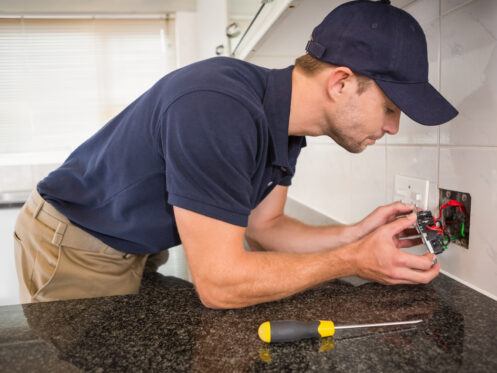The Lone Star State is home to numerous sectors and expansive landscapes. Its electrical industry is subject to strict laws that guarantee safety, dependability, and conformity with national standards. To safely and effectively negotiate the complexity of electrical work, experts, organizations, and individuals must understand the state’s electrical rules. In this guide, we’ll take a close look at Texas electrical regulations and compliance standards.
Requirements for Electrical Safety
The state of Texas places a premium on electrical safety measures for the benefit of both workers and residents. Compliance with the TDLR and Occupational Safety and Health Administration (OSHA) standards is essential for professionals operating electrical systems. Strict safety measures that electricians must follow include:
- Wearing protective equipment
- Implementing lockout/tagout procedures
- Following proper electrical isolation protocols
Wiring Methods and Materials
The National Electrical Code (NEC) specifies in great detail the standards that electricians in residential, commercial, and industrial settings must meet while installing electrical wiring. These rules cover the various types of conductors, insulation, and safety devices to use. Ensuring the safe and efficient functioning of electrical networks in Texas requires strict adherence to these requirements.
Specialized Installations
Electrical codes in Texas also cover unique installations, such as those in potentially dangerous areas or with very particular pieces of machinery. Equipment selection and installation techniques must be carefully considered in hazardous environments where combustible gases or vapors are present. The only way to reduce the likelihood of explosions or fires in places where safety is a concern is to follow these rules.
Renewable Energy Systems
Electricians and HVAC technicians in Texas must follow strict rules when working with renewable energy systems. These rules highlight the increasing popularity of systems that use renewable energy. The rules govern the design, installation, and maintenance requirements for these systems. Some of the more common renewable energy systems that homeowners use in Texas are:
- Geothermal heat pumps
- Solar water heating systems
- Biomass heating systems
- Wind turbines
- Solar air conditioning
- Rainwater harvesting systems
Emergency and Standby Systems
Many places rely on emergency and backup power systems, such as data centers, hospitals, and emergency services buildings. Texas electrical guidelines outline the installation and maintenance requirements for these systems. Guidelines cover generators, transfer switches, and other vital components of the backup systems. Being compliant guarantees that these systems will function reliably in the event of a power failure or other emergency.
Licensing Requirements
The TDLR is in charge of overseeing electrical projects in the Lone Star State. Anyone wishing to install or repair electrical systems must have a current TDLR license. Apprentice, journeyman, and master electrician are just a few of the licenses available, and each one has its own unique set of prerequisites and work history. Contractors must also obtain a license to work as an electrical contractor.
Continuing Education
Continuing education (CE) is essential for electricians and HVAC professionals in Texas to keep their licenses current. Annually, electricians must complete four hours of CE that address industry-related subjects and changes to the NEC. Annual CE for HVAC professionals is eight hours and must include subjects such as safety procedures, code revisions, and Texas laws and regulations. The CE requirements guarantee professionals keep up with the latest industry innovations and regulatory changes.
Electrical Inspections
Local governments or independent inspection firms in Texas are responsible for conducting electrical inspections. Qualified inspectors check electrical installations for conformity with state rules, municipal legislation, and the NEC during these inspections. Each homeowner is responsible for ensuring that their electrical work complies with safety requirements, submitting comprehensive blueprints, and obtaining any required permissions. Proper compliance requires coordination with local authorities, knowledge of particular code requirements, and adherence to inspection protocols.
Permitting Process
To begin electrical work in Texas, one must first get the necessary permissions. Permitting procedures differ from one municipality to another. Applicants usually have to provide comprehensive drawings describing the electrical project’s scope. Wiring installations, service panel improvements, and electrical system adjustments all need permits.
Grounding and Bonding
In Texas, electrical installations must adhere to the highest standards of grounding and bonding. These precautions are useful for avoiding electrical shocks and making sure safety gear works properly.
How to Choose the Best Electrician
Concern for the safety of electricity consumers is a top priority in the Lone Star State. Before hiring an electrician or contractor, homeowners and businesses should check their credentials to make sure they have a valid license from the TDLR. This forward-thinking method encourages openness and empowers customers to make educated choices when selecting electrical contractors. Here are five other pieces of criteria to consider to ensure you choose the best electrician.
Experience and Expertise
Experience and skill are crucial factors to consider when selecting an electrician. As a result of their extensive training and experience, licensed electricians are well-equipped to deal with a wide range of electrical problems. Seek out experts who have a history of success, the appropriate credentials, and a stellar reputation in the field. Accurate issue diagnosis, efficient solution provision, and precise project completion are all hallmarks of a skilled electrician.
Insurance Coverage
Working with electricity always carries a certain degree of danger. As a result, before hiring an electrician, make sure they have sufficient insurance. If an accident occurs or damage occurs to your property while the electrician works on your electrical system, insurance will pay for repairs. Verify that the electrician has injury and liability coverage in addition to workers’ compensation.
Transparent Pricing
One of the most important things to look for when choosing an electrician is honest pricing. Before beginning any job, a reputable electrician should provide a complete estimate that includes all of the expenses, including supplies, labor, and any extra charges. Make sure you ask about any possible hidden costs and steer clear of unclear estimates. In addition to helping you stay within your budget, an upfront price structure also builds confidence with the electrician.
Equipment and Technology
To be sure the electrician can manage your unique electrical demands, ask about the tools and technologies they utilize. Thanks to modern technology, electricians can work faster, pinpoint issues accurately, and finish jobs with pinpoint precision. The most reliable electricians keep up with the latest tech news and buy state-of-the-art tools.
Safety Practices
The most reliable electricians put safety first by always using the latest tools and techniques and by following all applicable regulations. Verify that the electrician does comprehensive inspections to find any dangers, wears the proper safety gear, and follows all applicable safety procedures. Paying close attention to safety measures safeguards not only the electrician and their crew but also your safety at home.
HR Phoenix understands the vast range of electrical regulations and requirements in Texas. We help homeowners with electrical panel installations, electrical repairs, plumbing, and more. Contact us now to learn how to make your home safer by choosing the best electrician.


